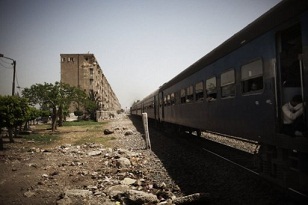BRUSSELS: Democracies around the world are turning a blind eye to abuses by repressive regimes, opting for improved relations rather than condemning rights violations and curtailing aid, Human Rights Watch says.
The international watchdog decried in its annual review published Monday the increasing use of dialogue and cooperation to urge reforms — but without any teeth to ensure that change occurs.
"Dialogue and cooperation have their place, but the burden should be on the abusive government to show a genuine willingness to improve," Kenneth Roth, executive director of the group, said in a statement accompanying the report. "In the absence of the demonstrated political will by abusive governments to make change, governments of good will need to apply pressure to end repression."
But many democracies are abandoning political pressure, accepting instead the rationalization of authoritarian governments, the report said.
It criticized UN Secretary-General Ban Ki-moon and European Union foreign policy chief Catherine Ashton in that regard.
It also singled out US President Barack Obama, saying "his famed eloquence … has sometimes eluded him when it comes to defending human rights." This was especially noticeable in contacts with countries that are important to US interests, such as China, India, Indonesia, Egypt and Bahrain, it said.
It praised the Norwegian Nobel committee for awarding the Nobel Peace Prize to imprisoned Chinese dissident Liu Xiaobo despite China’s displeasure.
Human Rights Watch blamed the growing reticence to confront abusers on the shifting global balance of power — particularly China’s rise as an economic and military power — and the declining moral authority of Western governments, because "their use with impunity of abusive counterterrorism techniques (has) made many governments less willing to take a strong public stand in favor of human rights."
On the list of most abusive countries were Belarus, China, Colombia, Congo, Cuba, Egypt, Indonesia, Iran, Myanmar, North Korea, Pakistan, Saudi Arabia, Yemen, and Zimbabwe.
The group also chided the European Union for what it called its failure to act against Uzbekistan and Turkmenistan, and complained about the West’s "soft reaction to certain favored African autocrats, such as Paul Kagame of Rwanda and Meles Zenawi of Ethiopia."
Defending human rights "may sometimes interfere with other governmental interests," the group said. "But if governments want to pursue those interests instead of human rights, they should at least have the courage to admit it, instead of hiding behind meaningless dialogues and fruitless quests for cooperation."
The report said fading interest in human rights issues among Western democracies is partly attributable to a decline in international news coverage. It said this had very serious implications for human rights groups working under repressive regimes who need the Western media to get their message out.
The 648-page report also documented numerous human rights abuses in Western nations themselves, such as the widespread and institutionalized discrimination in European Union countries against members of the Roma (Gypsy) minority.
It said the EU’s "record of discrimination and rising intolerance against migrants, Muslims, Roma, and others" along with other abusive practices suggest the EU and its member states "need to show greater political commitment to ensure that respect for human rights at home matches the EU’s rhetoric abroad."
"The use of dialogue and cooperation in lieu of pressure has emerged with a vengeance at the United Nations, from Secretary-General Ban Ki-moon to many members of the Human Rights Council," the group said.
It criticized as an example "the United Nations’ deferential attitude toward Sri Lankan wartime atrocities."
The United States was singled out for its failure to prosecute those suspected of involvement in torture — which is banned under international law.
"Despite overwhelming evidence that senior Bush administration officials approved illegal interrogation methods involving torture and other ill-treatment, the Obama administration have yet to pursue prosecutions of any high-level officials or to establish a commission of inquiry," the report said.



